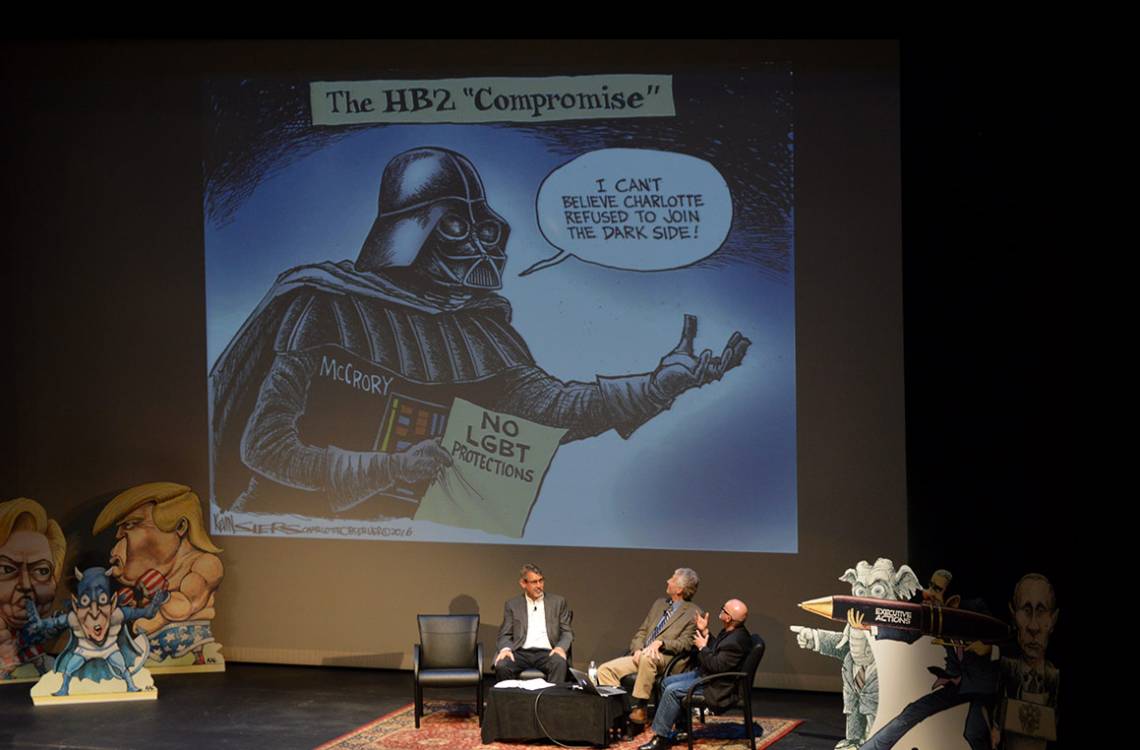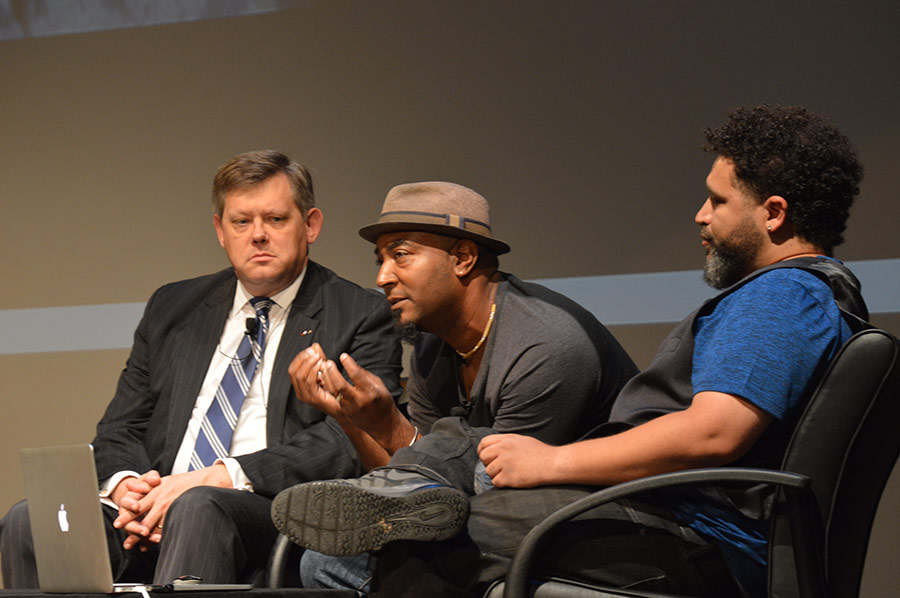Doh! Editorial Cartoonists Discuss Their Craft During Three-Day Festival
Several hundred people come to campus to listen to cartoonists from around the world

For three days last week, Duke hosted political cartoonists from around the world discussing how their work helps shape public opinion, including on hot-button issues such as NC House Bill 2 and the Black Lives Matter movement.
But it didn’t take long during the Political Cartoon and Satire Festival for the cartoonists to acknowledge their work may not have much influence over voters during this strange election season.
In the festival’s initial session, “Making Satire Great Again,” cartoonists David Horsey, Signe Wilkinson and Steve Breen agreed that, as the election nears, their work is likely changing fewer and fewer minds.
“There’s something so fundamental about [voters’] beliefs that I don’t think cartoons are going to change that,” Wilkinson said.
Added Horsey, “At this point, we’re just reinforcing the people who already agree with us.”
The festival -- sponsored by Duke and the Association of American Editorial Cartoonists (AAEC) -- drew several hundred people to Reynolds Theater and other campus venues.
The festival also featured student-cartoonist improv and sketch comedy performances, art exhibitions and live cartooning on the Bryan Center Plaza.
And on the last day of the festival, cartoonists took time to coach Duke students on their craft.
In addition to the AAEC, festival sponsors included POLIS: The Center for Political Leadership, Innovation and Service, the DeWitt Wallace Center for Media and Democracy, the Sanford School of Public Policy and Campaign Stop 2016.
Below are summaries of some of the festival panels:
Cartooning and the Black Lives Matter movement
As a young boy, Darrin Bell wanted to be a police officer.
Then one day, while walking down the street brandishing a water gun to ward off imaginary storm troopers, the 7-year-old Star Wars fan was stopped by a policeman who asked him where he was from and what he was doing.
“All I remember is that he had his gun out,” Bell recounted to a crowd at Reynolds Theater. “After that, I wanted to be a cartoonist.”
And now he is. Bell grew up to become an editorial cartoonist and creator of two comic strips. He was one of two African-American cartoonists -- along with Keith Knight -- to discuss cartooning and the Black Lives Matter movement.

Keith Knight discusses editorial cartoons on race and Black Lives Matter with NC Sen. Mike Woodard, left, and cartoonist Darrin Bell. Photo by Carol Jackson.
Bell and Knight spoke at length about their experiences with police and how it helped shape their world views and the work they do drawing provocative, deeply emotional cartoons.
Each spoke of the broad distrust in black communities for police, an all-too current topic given the protests just a couple hours down the road in Charlotte that followed a police shooting of a black man.
Each said they’re often asked if they infuse their cartoons with raced-based themes when addressing police shootings and other issues related to the Black Lives Matter movement.
“I don’t even engage with people about that anymore,” said Knight, the creator of three comic strips. “You have to quadruple your blinders to be ignorant that race has a role to play in all this.”
House Bill 2
House Bill 2 has proved irresistible for Kevin Siers, a Pulitzer-Prize winning cartoonist at The Charlotte Observer.
“This is a civil rights issue with lots of potty humor. Who can resist?” asked Siers. “Supporters of the legislation wanted a wedge issue, and they gave themselves a wedgie.”
The part of the law that requires people to use the bathroom of their biological gender has generated the most controversy. The panel was asked about this provision overshadowing other parts of the law, such as limiting state employee discrimination lawsuits and preventing municipalities from setting a local minimum wage.
Jim Morrill, a state government reporter for The Charlotte Observer, acknowledged some media coverage has “become shorthand in a lot of ways” because of this.
“A lot of time, when we write stories … because the law is so complicated those things get short shrift. We rarely mention the minimum wage part or stripped local governments’ rights to pass similar ordinances.”
Siers talked about the role of a cartoonist weighing in on such hotly debated social issues.
“I don’t think a cartoon will change someone’s mind, but it’s sort of like a one-two-punch” that softens people up for a well-reasoned argument in an editorial.

During the festival, Mike Jenkins and other editorial cartoonists took to the Plaza to sketch students. Photo by Alexis Bass.
Simpsons producers reveal their creative process during keynote event
Two days before The Simpsons' 28th season began on Fox, Jeff Westbrook, Carolyn Omine and Stewart Burns -- all of whom have produced and written for the animated series for more than a decade -- broke down the process of making a typical episode. It’s an endeavor that takes nine months to a year.
Though The Simpsons has satirized such topics as immigration, gun rights and presidential elections in the past, the panelists agreed it is hard to satirize current events, given how long it takes to produce just one episode. By the time it airs on television, any specific references in the script will likely be outdated.
Still, Burns assured the crowd there are few topics he and his colleagues are afraid of tackling, as long as they can find some humor in them.
"If you gave us a topic that you thought was taboo, we'd find a way to do it," he said.
One exception? Donald Trump might not appear in many Season 28 episodes, even as the election nears. Despite recognizing Trump as a timely subject of satire, Omine admitted, "We don't want to give him more attention."
Challenges of 2016 election coverage on fact-checkers
As the festival came to a close Saturday afternoon, three Duke alumni discussed the role of satire in their professional lives.
Adam Chodikoff, a longtime senior producer at The Daily Show, joined Naureen Khan and Ishan Thakore -- a researcher and former fact-checker at Full Frontal With Samantha Bee, respectively – to offer insight into their work processes during the "Facts and Comedy" panel.
As they commented on clips from their own TV shows, the panelists noted the importance of vigilant fact-checking, even when they feel disheartened by viewers who ignore objective truth.
"If you asked if I'm [leaning] left or right, I'm pro-truth. I go where the facts are," Chodikoff said. "There's so much fact-checking now. I would hope that, by osmosis, people are exposed to it."
When the floor was opened to audience questions, several came from Duke undergraduate students seeking advice for a career in the television industry.
According to Khan, a healthy dose of skepticism is crucial for anyone interested in political news, as well as the ability to think critically -- something she believes students are already learning in their classes at Duke.

Scott Stantis, a cartoonist with the Chicago Tribune, discusses cartooning from a conservative perspective. Photo by Joel Luther.
When does political satire go too far?
That question was at the center of “Likes, Loves and Lynch Mobs,” a panel that took a closer look at the dangers of cartooning in a social media-heavy world.
Joel Pett, Ann Telnaes and Matt Bors -- all of whom have prompted social media engagement, for better or worse, with polarizing cartoons -- broke down their most memorable experiences with negative reader feedback.
And although each panelist had become all too familiar with enraged and disgusted readers, they agreed that social media still helps to promote their own art.
“It’s been amazing for me to get my work out there,” said Telnaes, who, despite being called some unsavory names on Twitter for her controversial Ted Cruz GIF, earned 16,000 followers after her Cruz cartoon gained attention.
Bors said social media simply can’t be ignored in the modern journalism industry. “We’re actively trying to take political cartoons to where people are,” he said. “That’s Facebook and Twitter.”
Political cartoons cross international borders
In a panel titled “International Ink,” Venezuela’s Rayma Suprani, Kenya’s GADO and New Zealand’s Rod Emmerson shed light on how political cartoons are received differently outside of the United States.
Both Suprani and GADO have been fired from publications in their countries after publishing controversial artwork about politics at home and abroad. But they continue to create original artwork on their own time and, with the help of the Internet, are still able to reach wide audiences.
Although the panelists live and work thousands of miles from one another, they agreed it is impossible to ignore the impact of American politics, particularly during the 2016 election. The men and women on stage could be seen nodding vigorously as moderator Kevin “Kal” Kallaugher suggested, “Donald Trump might be the most well-known person in the world right now.”
Summaries of other panels can be found here. And a collection of Tweets during the festival, including one from an account parodying Gov. Pat McCrory, can be found here.
And even though the festival is over, the exhibit This Campaign is Yuuuge! Cartoonists Tackle the 2016 Presidential Race, will remain on display on the first floor of Rubenstein Hall at Duke’s Sanford School of Public Policy until Dec. 2.